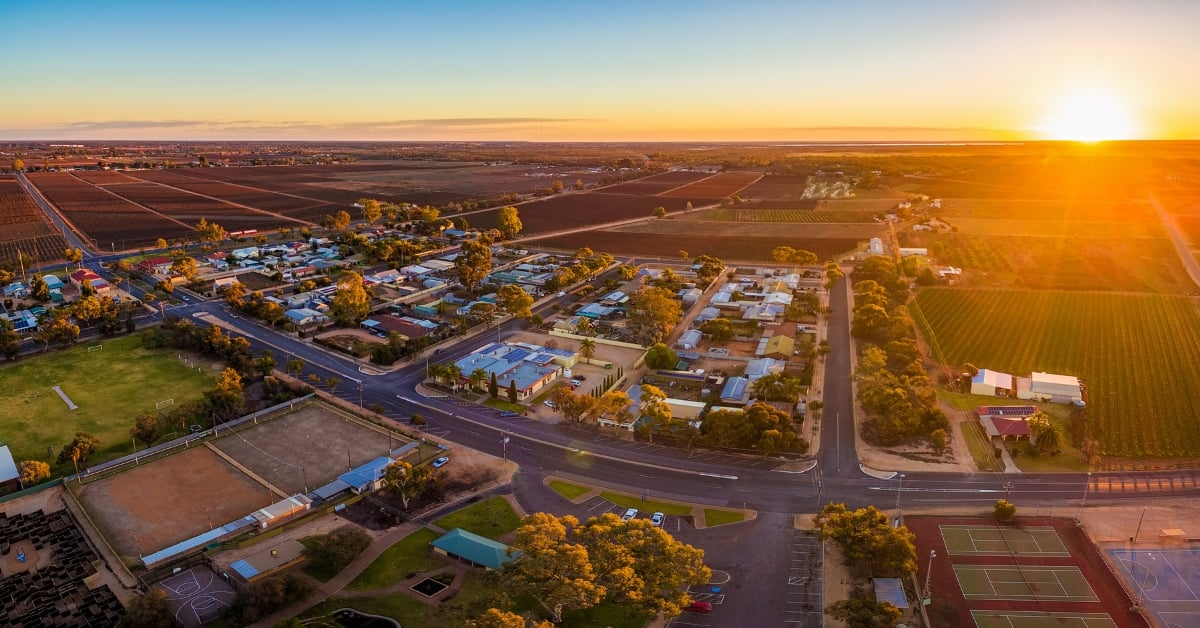Rural Property: Challenges and Opportunities

Dreaming of escaping to the country or making a rural property investment? It is well known that your real estate dollar will stretch a lot further outside of the metropolitan areas. While affordability is a key driver for this market, a relaxed lifestyle and healthy rental returns are also adding to the appeal. Rural living can be divided into four categories – inner regional, outer regional, remote and very remote. So, what are the pros and cons of making such a move or purchase? Let’s take a look at the opportunities and challenges in rural real estate.
Opportunities
Affordability
Looking at what you can buy in the country compared to the city for the same budget can be an eye-opener. It is not uncommon to find a single-level home on a large parcel of land for a fraction of the cost of an apartment in the city. If you have longed for acreage living, you may find it more affordable than the cost of a single-level suburban home.
Beachside or waterfront living is expensive in metropolitan areas but with more affordable options in regional coastal towns, this could become a reality.
Rents are also cheaper than in the city, so you don’t have to buy a property to be able to move to a rural area.
Lifestyle appeal
Country air has long been considered a remedy for good health. Who hasn’t returned from a short break away from the city feeling refreshed? Less traffic, factories and industrial facilities means less pollutants often found in the urban areas.
Australian country towns tend to have wide streets and larger block sizes adding to their attraction. It can be ideal for families looking for a sense of space and openness.
Living in a rural location often means being able to immerse yourself in breathtaking landscapes, with easier access to beaches or bushland for recreation activities.
It offers a slower pace of life and a wonderful sense of community. Sporting clubs are a common way to bond with locals. People tend to know each other and have a sense of belonging.
You no longer have to change jobs
Remote work has enabled many once-city-based workers to remain with their employers while living in the country. Even hybrid workers required to spend one or two days in the office can still move to a regional area. Look for a town just outside the metropolitan fringes with a train line providing direct access to the CBD. The benefits of living in the country can outweigh a longer commute for part of the week. Buying a rental home in the country with a separate study or office could also be seen as an advantage for investors.
Government incentives
If you are looking to increase your pay packet, then consider relocating to a regional or rural area. Take-home pay in the country can be higher due to several financial incentives aimed at attracting and keeping skilled workers living in these areas. You may also receive extra paid leave or even be given support for schooling and rental subsidies. Those working in the health and education sectors may see significant benefits.
Get a step on the property ladder
There are plenty of incentives for first-time buyers to head to country areas too. More affordable property means they are more likely to qualify for first-home buyer grants or even a full exemption from transfer duty.
Every State and Territory offers different programs, so be sure to check what is currently on offer in your area. Most schemes require the purchaser to live in the home for at least six months within a year of buying or completing the construction of the home.
Positive cash flow
Cheaper property means more affordable repayments. While it may take longer to see significant capital gains in a rural area compared to the city, there is an ability to pay off your mortgage sooner. This means you may be able to save for other things such as travel or renovations. If you are looking to invest, areas with shopping centres, medical facilities, low crime rates and schools are likely to be popular for families and renters. Be sure to look at whether the town has reliable and steady employment. Mining regions can pay high returns supply and demand can make it a more volatile market.
Expand your interests
Property investing is a great way to build wealth, it can improve cash flow and offer other tax benefits. A rural property can add diversity to your portfolio. Keeping your property maintained and renter-friendly will help it to grow in value. Depending on the size of the property, there may be potential to earn additional income through leasing or crop production.
Other ways of investing in rural property
You don’t need to purchase an entire farm to get into rural investing. Another option is fractional investing where you purchase a portion of property and receive a ‘fraction’ of rental income or ‘fraction’ capital growth. It is a little like crowdfunding but can help to reinvigorate rural communities. The property or part of it is divided into shares and sold off. This enables farmers to raise capital to improve productivity with the ability to retain most of their landholding.
Challenges
Remoteness
Relocating away from the city may be exciting but it can be a challenge living in unfamiliar surroundings. This includes adjusting to a different pace of life. It is important to find a routine and community activities where you can meet other locals.
If you are unsure about making such a change, then it may be a good idea to rent first before committing to buying a home.
For investors, it isn’t always easy to visit your rural investment, especially if you live hours away. This can be overcome with a reliable property manager who has great communication and can keep you informed of any problems.
Cost of living
While housing is more affordable in country areas, depending on your location you could be spending more on petrol, groceries and electricity. This can be due to freight, transport costs and lack of retail competition. It may be possible to offset some of these costs by buying produce directly from local farmers.
Meeting your future needs
Don’t forget about your long-term plans when relocating to a rural area. It may be great when the kids are little and can attend the primary school in town – but what about when they head off to high school or university? A lack of medical services, geographic isolation and poor infrastructure can also be a challenge.
Stock levels are low
Just like in the city, the housing supply has not kept up with population growth. This means there is still strong demand but not enough stock coming into what is already a very tight housing market. Demand for rental property remains high too as young professionals continue to relocate following the pandemic. Some regional towns are looking at potential high-rise developments as a solution.
Harsh climate
Drought, cyclones, bushfires and flooding are unfortunately not uncommon in Australia. Extreme weather events can impact agriculture and food production which can also affect the economy of rural towns. Unpredictable weather increases the risk of damage to crops and causes instability to the people who rely on farming for a living. All combined, the harsh weather can play a role in the health and well-being of rural residents.
Potential constraints
There are risks to purchasing rural properties that simply don’t concern suburban or inner-city property buyers. When buying a farm, be sure to check the property’s approved use and zoning. Local and state governments control the use and flow of all water in rivers and lakes, so check if you need a water licence. If you plan on growing crops, you may need an investigation by a horticulturist to ensure the soil is free of chemical residue. A search will also need to be undertaken to see if there is any native claim on the land. As with any real estate purchase, it is essential to have a building and pest report carried out on any rural property.
Locate one of our experienced real estate agents from one of the many regional or rural LJ Hooker offices and discuss your plans. They will be able to show you a range of properties to suit your budget and investment goals.
DISCLAIMER - The information provided is for guidance and informational purposes only and does not replace independent business, legal and financial advice which we strongly recommend. Whilst the information is considered true and correct at the date of publication, changes in circumstances after the time of publication may impact the accuracy of the information provided. LJ Hooker will not accept responsibility or liability for any reliance on the blog information, including but not limited to, the accuracy, currency or completeness of any information or links.


.jpg)
